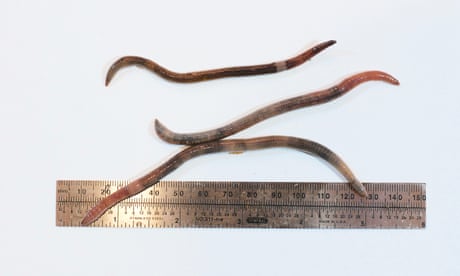- by foxnews
- 17 Mar 2025
‘Extremely active’ jumping worms that can leap a foot raise alarm in California
‘Extremely active’ jumping worms that can leap a foot raise alarm in California
- by theguardian
- 22 May 2022
- in news

An invasive worm species known for its "voracious appetite" and ability to jump a foot in the air is raising alarm in California, where scientists have expressed concerns about the threat the worms pose to forest ecosystems.
The Amynthas agrestis, also known as the Asian jumping worm, Alabama jumper or crazy snake worm, have been spotted in California in recent months. The earthworm is native to east Asia, particularly to Japan and the Korean peninsula. However, in recent years the worms made their way to North America via various landscape plants that have been imported from the region.
Initially spotted in Wisconsin and across the New England area in 2013, the worms have spread westward into dozens of states, and were first seen in California's Napa county in July.
The worms, which can grow up to 8in in length and have a milky white band around their dark body, are distinctive for their theatrical behavior, including wild movements and even detaching body parts. They're also hermaphrodites and can reproduce without mating, and produce cocoons at the soil surface.
"These earthworms are extremely active, aggressive, and have voracious appetites," California Department of Food and Agriculture (CDFA) warned in a report. "True to their name, they jump and thrash immediately when handled, behaving more like a threatened snake than a worm, sometimes even breaking and shedding their tail when caught."
Of greater concern, however, is the worms' impact on the environment. Jumping worms can destroy a forest ecosystem by chewing through fallen leaves, in turn destroying the top layer of forest soil upon which many plants and organisms depend.
"They are destructive and cause severe damage to hardwood forests, especially those consisting of maple, basswood, red oak, poplar or birch species that rely on thick layers of leaf litter that serve as rooting medium," according to the CDFA report, which notes that the "voracious feeders" can devour a cover of organic material in "two to five years".
"Soil is the foundation of life - and Asian jumping worms change it. In fact, earthworms can have such huge impacts that they're able to actually reengineer the ecosystems around them," Mac Callaham, a Forest Service researcher specializing in soils, said in a forest service blogpost.
Experts have recommended several strategies to detect and eliminate the worms, including using a mustard pour - a mixture consisting of water and yellow mustard seeds - over soil to drive out any worms to the surface, and covering moistened soil with a sheet of transparent polyethylene for two to three weeks until soil temperature exceeds 104F for at least three days, destroying the worm's cocoons.
Another strategy to eliminate the worms is to bag them and throw them in the trash, or place them in a bag and leave them out in the sun for at least 10 minutes before discarding the bag.
Experts have also advised people to take steps to prevent the worms from spreading in the first place. The USDA has warned that because the worms live in soil, they can easily spread in mulch, potting mixes or potted plants. Additionally, raking or blowing leaves can spread earthworms or their egg sacs.
When certain municipalities collect fallen leaves from local residents and then return it in the form of compost, this can also help spread the worms.
The CDFA has warned that the worms will likely be "able to establish a widespread distribution through California's forest habitat and ornamental production sites particularly in residential and commercial environments."
"If these worms didn't spread into forests and natural areas, they wouldn't be such a problem," said Callaham. "But unfortunately, they simply won't stay where you put them. The best way to prevent future invasions is to avoid moving earthworms around."
- by foxnews
- descember 09, 2016
Rare artifacts representing America's 250th birthday will be featured in major exhibition
Rare artifacts will be featured in the "Give Me Liberty" exhibit at the Virginia Museum of History & Culture in Richmond to commemorate America's upcoming 250th anniversary.
read more


